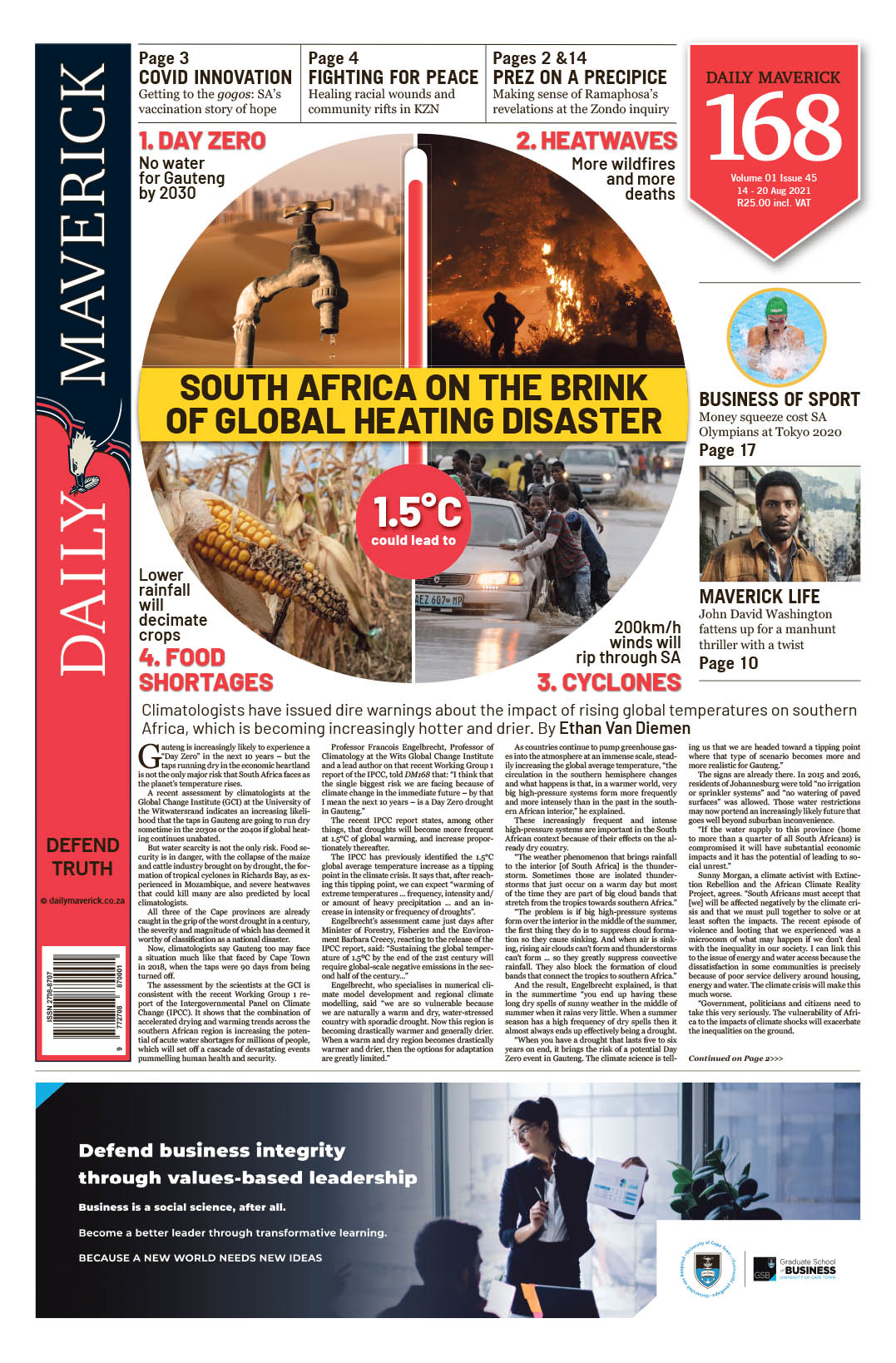First published in the Daily Maverick 168 weekly newspaper.
Throughout this pandemic, there has been no shortage of attempts to discern which political systems or leaders are best or worst suited to deal with such a situation. One thing has become clear, however: there is no clear answer.
Those democratic leaders who started off well and were widely lauded for their handling of the initial stages of the pandemic – take Jacinda Ardern of New Zealand and Angela Merkel of Germany, for example – have both suffered recent flagging approval ratings owing to problems over vaccination campaigns. Meanwhile, the draconian approach of autocratic China may have worked in 2020 to get the virus under control, but problems – viral or otherwise – persist. In early August, Wuhan – the original epicentre of the pandemic – was ordered back into lockdown. Hong Kong, meanwhile, shuts down any newspaper offering a whiff of revolutionary dissent.
And what of Italy, the centre of the European pandemic, a country usually perceived as an administrational basket case? After suffering the ignominy of being the original “red zone” in early 2020, owing to a relentlessly efficient vaccination roll-out, the Uffizi Gallery in Florence last week welcomed back its first visitors for months, while bars and restaurants across the traditional holiday spots of Sardinia and Sicily are back to pre-pandemic levels of freneticism. What was a vision of Old World apocalypse is now a narrative of sporting and social rebirth.
How to quantify this? Hervé Lemahieu, director of research at Australia’s Lowy Institute, has done a fascinating piece of research on assessing the “Covid performance index” that tracks the rate of infections, tests and deaths in more than 100 countries and attempts to show if political systems, levels of economic development or other factors have affected nations’ handling of the virus.
The answer thus far is simple, if beguilingly frustrating. Not one system, neither authoritarian autocracies nor liberal democracies, has been consistently more successful than any other. Whether it is the populist lunatic extremes at the fringe such as Brazil or the middling consensus-and-coalition Sweden – all have been fraught with differing phases of catastrophe over these testing months.
Democracy’s ultimate virtue is seen as being that it operates as a vehicle for individuals to take responsibility for their own lives. And yet in the context of a pandemic, while this may be admirable, it can prove to be disastrously myopic. Sweden’s stratospheric excess death count shows these risks all too clearly.
By contrast, current versions of populisms may be bipolar yet have been unfailingly found wanting. Strongman regimes such as those of President Rodrigo Duterte – who warned Filipino vaccine dodgers that he would administer it personally “in your butt” – are essentially paternalistic. These can be clearly contrasted with right-wing libertarian liabilities such as ex-president Donald Trump or Jair Bolsonaro in Brazil, who have overseen humanitarian catastrophes by essentially denying the threat. Neither approach has been less disastrous. The virus, as with so much else, transcends the specific lunacies of any particular demagogue.
Yet the research is instructive. Small countries (below 10 million people) have done better than bigger ones. Islands, perhaps self-evidently, have also been more effective at keeping out the pestilent virus than countries with numerous leaky land borders.
Lemahieu names three other variables that have seemed to correlate with successful outcomes: competent state institutions; smart political leadership allied with medical expertise; and governments that citizens trust enough to heed.
The past 18 months have enforced on our collective consciousness the importance of making systems resilient in the face of unforeseen threats.
This research is perhaps informative for discerning which characteristics may be critical for attaining that otherwise broadly nebulous concept of systemic resilience.
Interestingly, a point that Lemahieu makes clear is that there has been an apparent “winner’s curse” afflicting those countries that handled the initial stages of the pandemic well but then became complacent. Could we infer, therefore, that countries that have dealt with other pandemics and social stresses prior to the Covid-19 pandemic may indeed be more structurally and societally resilient?
For South African policymakers and indeed investors, on the surface this report makes for uneasy reading. South Africa is an uncomfortably large country with hollowed-out institutions, an economically desperate populace, essentially vacant political leadership, a desperately wanting public-health system and a deficit of basic political trust, which resulted in mass looting only a few weeks ago.
And yet, reading deeper, this report may be cause for reassurance. The recent pick-up in vaccinations is an example of how well South Africa can perform under pressure. In addition, owing to the travails of South Africa’s recent and distant past there is an inherent social resilience “baked into the cake”. It can be argued that South Africans are generally that much tougher at dealing with threats posed by a virus – and much besides – than many others.
While this pandemic has pushed all societies to breaking points, South Africa has not broken. That in itself is cause for hope. DM168
This story first appeared in our weekly Daily Maverick 168 newspaper which is available for R25 at Pick n Pay, Exclusive Books and airport bookstores. For your nearest stockist, please click here.



















 Become an Insider
Become an Insider
Comments - Please login in order to comment.